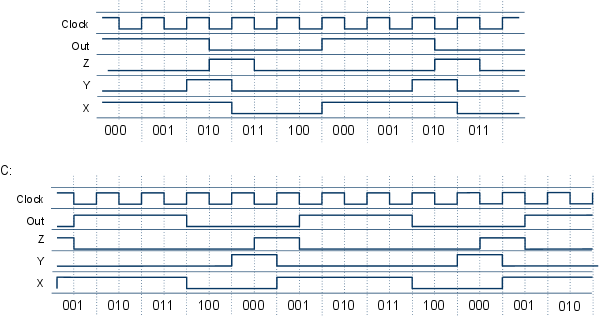It's supposed to have one major problem
The one possible problem that jumps out at me is glitch prevention. Your output is a clock signal, so it would be very sensitive to extra edges. But it is a combinational output, so it can be prone to glitches.
Just as an example, let's say you had this naive implementation of a full carry generator (at least 2 inputs of 3 are true), namely
Y = ABC + AB(!C) + A(!B)C + (!A)BC
If your ABC signals switch from 111 to 011, there is a chance, depending on propagation delays, that the output Y, which should be a 1 the entire time, gives you a short glitch of 0. What's basically going on is that the output's trueness has to shift from one term to another: ABC -> (!A)BC in this case. If the (!A)BC term has a longer propagation delay than the ABC term for the 1 -> 0 transition on A, then both terms ABC and (!A)BC can be 0 for a short period of time, and you get a 0 as an output.
A proper implementation is one where a single input bit change produces no glitches in the output: the output's level is shared by two terms as it transitions. In the case of a full-carry generator, this works:
Y = AB + BC + CA
In your case, there are two possible causes of glitches.
One is that X and Z change at nearly the same time -- but in your case, according to your timing diagrams, this shouldn't happen.
The other is that the combinational logic that produces X is glitch-prone. We don't know how it's implemented, so that's hard to say.
The simplest solution in either case is to stick a flip-flop on the output, with the same clock input as your other flip-flops. Modern flip-flops have sample/hold specs such that any propagation delay >= 0 and < (clock period - setup time) will produce stable, glitch-free outputs, so unless your clock period is really fast, any glitch on the input of the flip-flop will settle out by the start of its setup time window on the next clock edge.
If you can't tolerate the delay of putting a flip-flop on the output, you need to guarantee that all combinational logic directly producing the output is glitch-free.


